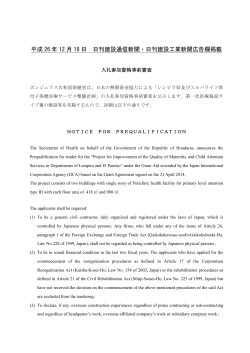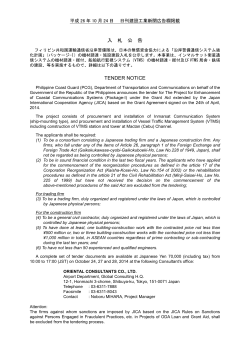
January, 2015 - JICA Research Institute
http://jica-ri.jica.go.jp newsletter January 2015 No. 67 IN THIS ISSUE: Hot Issue JICA-RI Holds a Public Seminar on the JOCV Study On December 13, 2014, the Fourth Seminar of Japan Overseas Cooperation Volunteers (JOCV) Study entitled “Between Development Assistance and Youth Development” was held at JICA Kansai in Kobe. READ MORE Review Urban Cities, Climate Change and Finance: JICA-RI Hosts a Side Event at COP20 in Lima The 20th session of the Conference of the Parties to the United Nations Framework Convention on Climate Change (COP20) took place in Lima, Peru from December 1 to 12, 2014. READ MORE Review RI-Focus No.30: Interview with Deputy Director Naohiro Kitano Deputy Director Naohiro Kitano talks about JICA-RI research project “Comparative Study on Development Cooperation Strategy: Focusing on G20 Emerging Economies,” and the future perspective of Japan’s Official Development Assistance. READ MORE Review Publications Released Two books based on research projects were released: disability and education, and Muslims in Southeast Asia. A joint working paper with KOICA on the Green Climate Fund was published. READ MORE Copyright © 2015 Japan International Cooperation Agency Research Institute All rights reserved JICA Research Institute 10-5 Honmura-cho, Ichigaya, Shinjuku-ku, Tokyo, 162-8433 Japan • Tel: 81-3-3269-2911 • dritpl@jica.go.jp Hot Issue Between Development Assistance and Youth Development: JICA-RI Holds a Public Seminar on the JOCV Study in Kobe characteristics of volunteers for rural development that does not require high expertise in the JOCV program. JICA-RI Researchers In the presentation, he indicated that the rural development volunteers have strength in planning and implementing activities together with local people in the field without a preconceived idea, as they do not have a high level of expertise. On December 13, 2014, the Fourth Seminar of Japan Overseas Cooperation Volunteers (JOCV) Study entitled “Between Development Assistance and Youth Development” was held at JICA Kansai in Kobe. JICA-RI has been conducting “the Interdisciplinary Study of Japan Overseas Cooperation Volunteers (JOCV)” since 2012. This project has organized three public seminars to disseminate its research outcomes. The seminar this time was the fourth and research presentations were given with a focus on the JOCV’s objectives, particularly the relationship between development assistance and youth development. Lastly, JICA-RI Research Fellow Sakiko Shiratori and Research Assistant Kazuya Suda presented the typologies of JOCVs. Based on the data of JOCVs, they statistically analyzed their motivations for applying to JOCV. The result showed that the personality of JOCVs can be divided into six types, which are; “curious,” “business-minded,” “development assistance,” “quest for oneself,” “change-oriented,” and “altruism.” They suggested that this classification can provide practical information for exploiting the potential of JOCVs as global human resources, recruiting volunteers, and the planning of effective voluntary activities. Firstly, JICA-RI Senior Research Fellow Yasunobu Okabe presented his historical study of the JOCV’s establishment and its development. He explained that there were several political factors to influence JOCV’s genesis in 1965: the relations with the US under the Cold War, youth issues in rural and urban areas, the influence of leaders of youth associations and the young politicians of the Liberal Democratic Party (LDP), and the reaction of the Ministry of Foreign Affairs (MOFA). Further he pointed out that a tension and compromise between MOFA, and LDP and youth associations had made the JOCV program with multiple purposes, such as development assistance in developing countries, promotion of mutual understanding, and fostering of the international perspectives (youth development). He argued that this compromise, however, enabled JOCV to enjoy organizational support and also to obtain the support of local government and the JOCA’s alumni association, to the extent that JOCV has been expanding for 50 years. One of the panelists, Professor Michiyo Hashiguchi, Graduate School of Advanced Integrated Studies in Human Survivability (Shishu-Kan), Kyoto University, commented that one of the challenges that the JOCV program faces is keeping a balance among global human resources development, the characteristics as volunteers, and the expertise necessary for technical assistance. In addition, Executive Advisor to the Director General Hiroto Mitsugi, Secretariat of JICA’s Japan Overseas Cooperation Volunteers, mentioned that the relationship between development assistance and youth development has been a long discussed issue and the outstanding characteristics of the JOCV programs. Subsequently, Associate Professor Chihiro Shirakawa, Graduate School of Human Sciences of Osaka University, made a presentation on “JOCV as Volunteers.” Based on his own experiences as a JOCV volunteer, he analyzed the 2 JICA Research Institute Newsletter No.67 • January 2015 Review Urban Cities, Climate Change and Finance: JICA-RI Hosts a Side Event at COP20 in Lima The 20th session of the Conference of the Parties to the United Nations Framework Convention on Climate Change (COP20) took place in Lima, Peru from December 1 to 12, 2014. JICARI Senior Research Fellow Tomonori Sudo participated and hosted two side events on the themes of urbanization and climate financing at the Japan Pavilion at the conference. opportunities to apply such lessons into climate finance. The experts from development finance institutions and development agencies, such as the KfW Development Bank joined the session. To open the discussion, Sudo raised several key questions on the critical elements for effective use of climate finance. He also introduced the example of the Latin America and Caribbean Sustainable Energy Project by JICA’s overseas loan. He Tomonori Sudo pointed out the importance of the mainstreaming of climate change in development, the generation of co-benefits, ownership by developing countries, and various resource mobilizations catalysed by public funds. Through the discussion, it was confirmed that speed of assistance, investment on project with high adaptability, consideration of investment cost, and result-based investment are important. “Urban, Climate Change and Finance” (15:00 – 16:30, December 5) Rapid urbanization is one of the emerging issues in the world. Unplanned population and economic growth will cause serious problems in urban areas. The objective of this event was to seek a practical and realistic vision for “Lowcarbon and climate resilient cities.” Sudo firstly raised several questions on the policy to realize climate resilient cities and the use of development funds. He also introduced JICA’s experiences in supporting developing countries, based on which he highlighted the importance of the formulation and implementation of appropriate master plans, good coordination among stakeholders, and strengthening of fiscal management capacity by municipalities. Besides the two events organized by JICA-RI, Sudo joined at a side event organized by the Indonesian Government entitled “Mainstreaming Green Financing.” Participating as a panellist, Sudo commented that the improvement of investing environment for climate financing and mobilizing various financing resources in Indonesia to respond a wide range of needs, and the role of public funds should be considered, while referring to his research results on green growth. The panellists shared experiences such as urban development in Malaysia as well as policies and the initiatives of the respective organizations such as OECD. The participants identified significant issues to realize “lowcarbon and climate resilient cities” as policymaking based on scientific evidence and the promotion of private partnerships. The presentations at the events hosted by JICARI are available for download from the website of JICA-RI. “Climate Finance and the Role of Development Finance Institutions” (13:00 – 14:30, December 6) The effective use of climate finance is critical to achieve climate compatible development. The objective of this event was to seek valuable lessons from experiences of development finance institutions and identify challenge and <Related Link> * JICA-RI Website * The site of delegation of Japan * The site of delegation of Indonesia 3 JICA Research Institute Newsletter No.67 • January 2015 Review JICA-RI Focus Vol. 30 Interview with Deputy Director Naohiro Kitano JICA-RI has been conducting a research project focusing on aid by emerging donors. Deputy Director Naohiro Kitano, who leads the research project “Comparative Study on Development Cooperation Strategy: Focusing on G20 Emerging Economies” talks about the project and the future perspective of Japan’s Official Development Assistance (ODA). Could you tell us about the background and purpose of the research project focusing on emerging donors? We have witnessed significant changes in development aid in recent years. In 2011, among the flow of private funds from developed countries to developing countries, foreign direct investment and overseas remittances accounted for 47% and 21% respectively whereas ODA accounted for only 17% (Organization for Economic Co-operation and Development (OECD)). This ODA figure decreased from 28% in 2002. Furthermore, in addition to the “traditional” donors, i.e., OECD DAC member countries, we see new players in ODA. Emerging countries, such as China, now provide ODA to other developing countries. China has been expanding the amount of foreign aid rapidly and is now ranked at sixth after France among DAC member countries according to our estimate. China is also playing a leading role in establishing the Asian Infrastructure Investment Bank (AIIB). Deputy Director Kitano An example of such efforts is a working paper on China’s foreign aid entitled Estimating China’s Foreign Aid 2001-2013 published in June by our institute. The paper estimates China’s foreign aid in terms comparable with the ODA figures defined by DAC. The paper has received considerable attention in the international community because this kind of information had not been readily available. The research project also shed light on other aspects of emerging donors, such as the support towards democratization by India, Indonesia’s tripartite cooperation, and the generation and transfer of development knowledge among developing countries. In the course of research activities, we intend to strengthen our partnership with researchers and institutions abroad. For example, a joint seminar is planned with the German Development Institute (Deutsches Institut für Entwicklungspolitik (DIE)), an institution which has extensive research experience in emerging countries. We hope that more researchers, especially those from developing countries will join us so that JICA-RI can become a global platform for professionals and active discussions on aid. Given these circumstances, it is necessary to analyze closely the aid and its impact by emerging countries and make a comparison with DAC member countries. However, data and information on aid by emerging countries are very limited. For this reason, the project first attempts to understand the facts and actual situation of development aid from those countries. ...Continued on next page 4 JICA Research Institute Newsletter No.67 • January 2015 Review ...Continued from the previous page How did you get interested in the development assistance strategies of emerging countries including China? What role should Japan’s ODA play in the future? I expect Japan’s ODA to play the role of a “catalyst” for better change. ODA should not be limited to the provision of funding and technology transfers to developing countries, but should play an important role as a catalyst for social transformation, mobilizing the private sector and civil society. Caving brought me where I am today. I had been an enthusiastic cave explorer since I was a teenager and had a great interest in many unexplored long and deep limestone caves in China. When I was studying civil engineering as a college student, I decided to study in China, where I had the chance to travel throughout China visiting many limestone caves during the breaks between semesters. This experience of living in a developing country sparked my interest in development cooperation. My Chinese friends, many of whom went to the United States to study, encouraged me in pursing an academic career too. I continued my studies and later received a PhD in city and regional planning in the United States. One example of JICA working as a catalyst is the polio eradication project in Pakistan. The project enlisted private funds by using what is referred to as a “loan conversion” mechanism. In this case, the Bill & Melinda Gates Foundation repays the loan from JICA on behalf of the government of Pakistan if the project is successfully implemented. Another example is the “One Village, One Product” project in Kyrgyzstan, Central Asia. Craftworks made in Kyrgyz under the project were sold as Christmas gifts by Ryohin Keikaku Co., Ltd., known for its MUJI brand. The project has brought social changes to the region, such as improvements in the social status of women and their income. A large-scale infrastructure project can also bring about great social change. For example, Bangkok Metro, constructed with financing by JICA’s yen loan, introduced barrier-free and universal designs in the facilities after The Mass Rapid Transit Authority of Thailand consulted and shared ideas with groups representing disabled persons at each stage of the project. I have long been engaged with China directly or indirectly throughout my career. I took charge of many JICA projects in China, and worked at the former Overseas Economic Cooperation Fund (OECF) Beijing Office for four and a half years. In terms of research, I had originally worked on China’s urbanization and environmental issues. As China’s foreign aid rapidly increases, I have started to look at China’s foreign aid as a researcher. China’s foreign aid has long been a subject of scrutiny and controversy. But I believe that Japan, China, and other countries should improve the quality of development assistance through friendly competition. We can all learn from each other. Japan has a long history of development. Building on its own experiences, Japan should play a leading role in the international development agenda where we have comparative advantages, such as “universal health coverage (UHC)” or the “dissemination of disaster risk reduction (DRR).” By sharing Japan’s knowhow and knowledge with the world, both in bilateral and multilateral cooperation, Japan can further enhance its function as a catalyst for better change. JICA-RI Working Paper Kitano & Harada. (2014) Estimating China’s Foreign Aid 2001-2013. JICA Research Institute Working Paper No.78 JICA-RI Website Link to Researcher Profile 5 JICA Research Institute Newsletter No.67 • January 2015 Review Publications Released Two books based on research projects were released: disability and education, and Muslims in Southeast Asia. A joint working paper with KOICA on the Green Climate Fund was published. Book “Disability, Education and Employment in Developing Countries: From Charity to Investment” Author: Kamal Lamichhane Publisher: Cambridge University Press Southeast Asia suddenly became a risk in the context of the global war on terrorism. This volume seeks to bridge the gap between these opposing perceptions by analyzing the Muslim responses to globalization and process of negotiation in Southeast Asia. Based on empirical data from developing countries including Nepal, India, Bangladesh, Cambodia, and the Philippines, this book systematically analyzes the relationships between disability, education, and employment in developing countries. Analysis shows that investment in human capital, particularly in the form of education and employment of persons with disabilities, is one of the most important factors in promoting both social inclusion and economic empowerment. In addition, when education and labor markets are made inclusive and accessible to persons with disabilities, not only does their livelihood improve, but so do the prospects of their families and society as a whole. Joint Working Paper with KOICA “Enhancing Readiness Programs for the Green Climate Fund” Author: Eunkyoung Hong, Tomonori Sudo The Green Climate Fund (GCF) was established in 2011 under the agreement of the COP16 in order to respond to the need of developing countries in reducing or mitigating their greenhouse gas emissions and adapting themselves to the impacts of climate change. This paper identifies the gap between “the readiness program” which enables developing countries to meet the standards, and the needs of the recipient countries and suggests five policy-recommendations towards the effective operation of the GCF. Book “Southeast Asian Muslims in the Era of Globalization” Editor: Ken Miichi, Omar Farouk Publisher: Palgrave Macmillan Islam and Muslims in Southeast Asia have been described using two sets of contradictory terms. On the one hand, they are imagined as being Sufistic, syncretistic and localized, and thought to be different from their counterparts in the Middle East. On the other hand, the danger of radical Islam has been emphasized and 6 JICA Research Institute Newsletter No.67 • January 2015
© Copyright 2025










